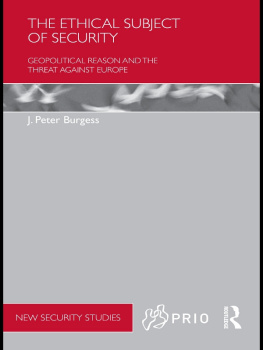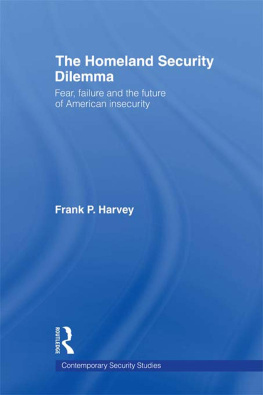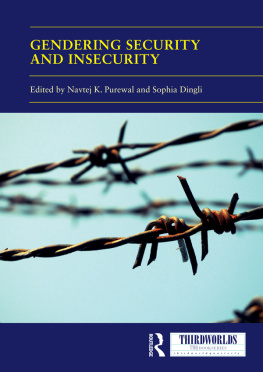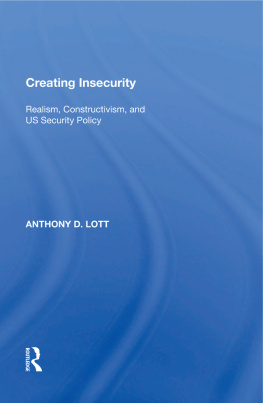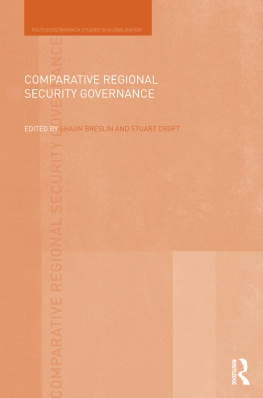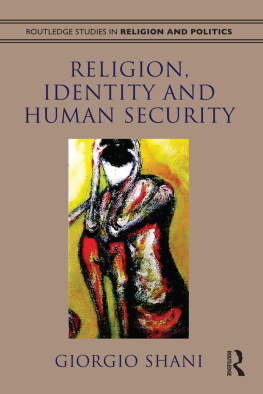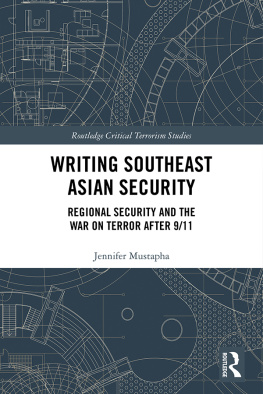The Ethical Subject of Security
While critical security studies largely concentrates on objects of security, this book focuses on the subject position from which securitization and other security practices take place.
First, it argues that the modern subject itself emerges and is sustained as a function of security and insecurity. It suggests, consequently, that no analytic frame can produce or reproduce the subject in some original or primordial form that does not already reproduce a fundamental or structural insecurity. It critically returns, through a variety of studies, to traditionally held conceptions of security and insecurity as simple predicates or properties that can be associated or not to some more essential, more primeval, more true or real subject. It thus opens and explores the question of the security of the subject itself, locating, through a reconstruction of the foundations of the concept of security in the modern conception of the subject, an irreducible insecurity.
Second, it argues that practices of security can only be carried out as a certain kind of negotiation about values. The analyses in this book find security expressed again and again as a function of value cast in terms of an explicit or implicit philosophy of life, of culture, of individual and collective anxieties and aspirations, of expectations about what may be sacrificed and what is worth preserving. By way of a critical examination of the value function of security, this book discovers the foundation of values as dependent on a certain management of their own vulnerability, continuously under threat, and thus fundamentally and necessarily insecure.
This book will be an indispensible resource for students of Critical Security Studies, Political Theory, Philosophy, Ethics and International Relations in general.
J. Peter Burgess is Research Professor at PRIO, the Peace Research Institute Oslo, where he leads the Security Programme and edits the interdisciplinary peer-reviewed journal Security Dialogue, and Senior Research Fellow at the Institute for European Studies of the Vrije Universiteit Brussels.
PRIO New Security Studies
Series Editor: J. Peter Burgess
PRIO, Oslo
The aim of this book series is to gather state-of-the-art theoretical reflexion and empirical research into a core set of volumes that respond vigorously and dynamically to the new challenges to security scholarship.
The Geopolitics of American Insecurity
Terror, Power and Foreign Policy
Franois Debrix and Mark J. Lacy (eds)
Security, Risk and the Biometric State
Governing Borders and Bodies
Benjamin Muller
Security and Global Governmentality
Globalization, Governance and the State
Miguel de Larrinaga and Marc G. Doucet
Critical Perspectives on Human Security
Rethinking Emancipation and Power in International Relations
David Chandler and Nik Hynek (eds)
Understanding Securitisation
The Design and Evolution of Security Problems
Thierry Balzacq (ed.)
Feminist Security Studies
A Narrative Approach
Annick T. R. Wibben
The Ethical Subject of Security
Geopolitical Reason and the Threat against Europe
J. Peter Burgess
The Ethical Subject of Security
Geopolitical reason and the threat
against Europe
J. Peter Burgess
First published 2011
by Routledge
2 Park Square, Milton Park, Abingdon, Oxon, OX14 4RN
Simultaneously published in the USA and Canada
by Routledge
270 Madison Avenue, New York, NY 10016
Routledge is an imprint of the Taylor & Francis Group, an informa business
This edition published in the Taylor & Francis e-Library, 2011.
To purchase your own copy of this or any of Taylor & Francis or Routledges collection of thousands of eBooks please go to www.eBookstore.tandf.co.uk.
2011 J. Peter Burgess
The right of J. Peter Burgess to be identified as author of this work has been asserted by him in accordance with sections 77 and 78 of the Copyright, Designs and Patents Act 1988.
All rights reserved. No part of this book may be reprinted or reproduced or utilized in any form or by any electronic, mechanical, or other means, now known or hereafter invented, including photocopying and recording, or in any information storage or retrieval system, without permission in writing from the publishers.
British Library Cataloguing in Publication Data
A catalogue record for this book is available from the British Library
Library of Congress Cataloging-in-Publication Data
Burgess, J. Peter.
The ethical subject of security : geopolitical reason and the threat against Europe / J. Peter Burgess.
p. cm.
1. National securityMoral and ethical aspectsEurope. 2. Internal securityMoral and ethical aspectsEurope. I. Title.
UA646.B87 2011
172'.4dc22
2010038602
ISBN 0-203-82894-1 Master e-book ISBN
ISBN13: 978-0-415-49982-8 (hbk)
ISBN13: 978-0-415-49981-1 (pbk)
ISBN13: 978-0-203-82894-6 (ebk)
Voor Karen, hart en geest van het werk
Acknowledgements
I am indebted to many people for the ideas that take form in this book. Some are close collaborators, others are distant inspirations, others still are anonymous interlocutors with whom I have debated in conference and workshop settings. Those perhaps most present in these pages are Claudia Aradau, Thierry Balzacq, Endre Begby, Didier Bigo, Pinar Bilgin, David Campbell, John Carville, Simon Chesterman, Carol Cohn, Bill Connolly, Christopher Daas, James Der Derian, Mike Dillon, Cynthia Enloe, Serge Gutwirth, Lene Hansen, Paul de Hert, Jef Huysmans, Vivienne Jabri, Oliver Kessler, Jennifer Klot, Mark Lacy, Anna Leander, Luis Lobo-Guerrero, Cristina Masters, Jean-Christophe Merle, Emilio Mordini, Rens Van Muster, Andrew Neal, Taylor Owen, Mark Salter, Mike Shapiro, Ole Wver, Cynthia Weber, Annick Wibben and Mike Williams.
My collaborators at PRIO, the Peace Research Institute Oslo, have been invaluable in my efforts. I have enjoyed the continuous support and friendship of Stein Tnnesson, former Director of PRIO, and the continued confidence of its new Director, Kristian Berg Harpviken. I am grateful to my closest collaborator and irreplaceable managing editor of Security Dialogue, Marit MoePryce. Valuable research assistance was also provided in particular by Jonas Grns, Monica Hanssen, Mareile Kaufmann and Christa Waters. PRIOs uncommonly competent administrative staff gave support throughout.
I am happy to acknowledge previous use of some of the material that appears in this book. The Introduction develops ideas present in a variety of settings, some of which appear in the The value of security, in Europes 21stCentury Challenge: Delivering Liberty (Bigo, Guild, Carrera and Walker (eds), London, Ashgate). An early draft of Chapter 1 was presented in a workshop on the Biopolitics of Value(s) at the University of Keele in early 2010. A first sketch of Chapter 2 was presented at a conference in Rome the Military Centre for Strategic Studies (CeMiSS) in 2004, and parts of Chapter 4 were presented at a conference on New Landscapes of Justice and Security at the Faculty of Law, University of Oslo, in spring 2010. Chapter 7 was presented at a conference on

